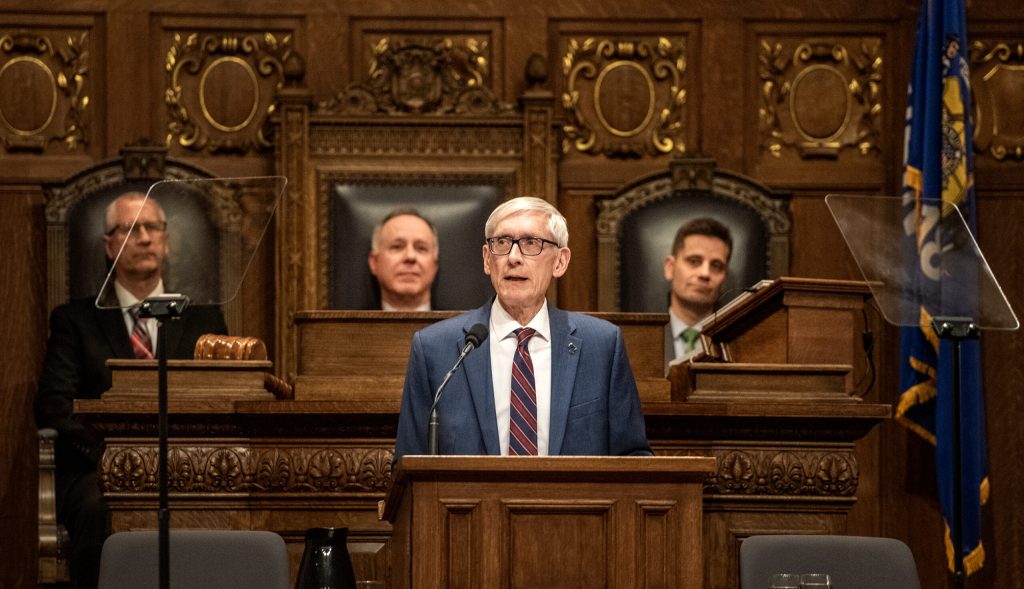Wisconsin Supreme Court Limits Legislature’s Authority To Block Governor
6-1 decision rules that legislators wrongly blocked DNR stewardship funding.

The Wisconsin Supreme Court on Wednesday, June 9, 2021, at the Wisconsin State Capitol in Madison, Wis. Angela Major/WPR
GOP lawmakers overstepped their constitutional authority when they used a committee to block certain gubernatorial actions, Wisconsin’s Supreme Court concluded in a 6-1 ruling.
Friday’s near-unanimous decision hands a major victory to Democratic Gov. Tony Evers, who filed a lawsuit arguing legislative committees like the GOP-led Joint Finance Committee violated the separation of powers established in Wisconsin’s Constitution.
In circumventing the DNR’s ability to carry out those purchases for what’s known as the Knowles-Nelson Stewardship Program, Wisconsin’s budget-writing committee “intruded” on executive power, six justices concluded.
“Maintaining the separation of powers between the branches is essential for the preservation of liberty and a government accountable to the people,” conservative Justice Rebecca Bradley wrote in the majority opinion. “By placing the power of the executive branch to carry out the law in a committee of the legislature, the legislative branch subsumed the executive power.”
Evers called the ruling a “victory for the people of Wisconsin” in a statement Friday.
“Republican lawmakers have spent years giving themselves outsized influence and power that they’ve used to unconstitutionally obstruct basic government functions and prevent my administration from doing the people’s work,” the statement said. “I’ve spent years working against near-constant Republican obstruction, and this historic decision rightfully resets constitutional checks and balances and restores separation of powers.”
“These provisions have ensured taxpayer resources are spent wisely and that local communities and stakeholders have had a seat at the table on important projects impacting their area,” the statement said. “This decision removes our current legislative oversight process. Our entire stewardship program is now in jeopardy.”
Evers has long been engaged in a tug of war over authority with Wisconsin’s Legislature. Republicans hold a majority in both Wisconsin’s Senate and Assembly, but are just shy of the Assembly supermajority needed to override vetoes from the governor.

Gov. Tony Evers delivers the State of the State address Tuesday, Jan. 23, 2024, at the Wisconsin State Capitol in Madison, Wis. Angela Major/WPR
The head of Wisconsin’s department of education celebrated Friday’s ruling, indicating that impacts will be felt broadly across state agencies.
State Superintendent Jill Underly urged the Joint Finance Commission to send out $50 million in funding that’s been approved by the full Legislature with the governor’s sign-off for implementing a new early literacy program.
Additionally, the governor is in the midst of a dispute with the Joint Finance Committee over the release of $125 million to clean up harmful chemicals known as PFAS.
Although Wisconsin’s elected Supreme Court seats are officially nonpartisan, justices seen as liberal have held a 4-3 majority since last August. Chief Justice Annette Ziegler filed the lone dissenting opinion in the legislative powers decision.
Ziegler, a conservative, wrote there was no good reason for the court to “fast-track” the JFC’s handling of land conservation purchases ahead of other matters brought to the court.
“Consistency has not always been the new majority’s strong suit, but when it comes to picking political favorites, they have been unwaveringly faithful to the cause,” Ziegler wrote. “Instead of allowing this case to proceed through the process, sifting and winnowing the issues, and then taking all the issues at the same time, which would serve to produce consistency, they forge on. Selecting an issue that only impacts the Republican-controlled legislature and the longstanding Knowles-Nelson Stewardship Program should raise eyebrows.”
Justices heard oral arguments in the case this April.
GOP committee overstepped authority by blocking governor, state Supreme Court finds was originally published by Wisconsin Public Radio.
If you think stories like this are important, become a member of Urban Milwaukee and help support real, independent journalism. Plus you get some cool added benefits.





















The votes of the Joint Finance Committee were always in secret with no disclosure on how any member voted. One member could veto any purchase that they did not like. Republicans talk about transparency but only for the Democrats. The way this system functioned was open for corruption or the appearances of corruption like the attempted recent Ozaukee County Cedar Gorge Clay Bluff land purchase.
“Maintaining the separation of powers between the branches is essential for the preservation of liberty and a government accountable to the people”.
Supreme Court chief justice John Roberts could learn a thing or two from this 6-1 majority WI Supreme Court decision.
Anybody think squak radio will mention the 6-1 vote or will they imply it was 4-3 to rile their gullible audience?